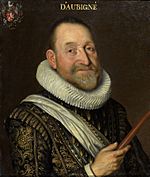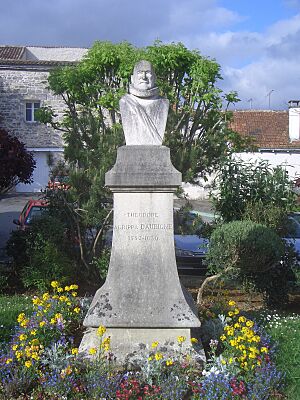Agrippa d'Aubigné facts for kids
Quick facts for kids
Agrippa d'Aubigné
|
|
|---|---|
 |
|
| Born | 8 February 1552 Château de Saint-Maury, Pons, Charente-Maritime, France |
| Died | 29 April 1630 (aged 78) Geneva, Switzerland |
| Occupation | Poet, soldier |
| Nationality | French |
| Period | 16th century |
| Genre | Poetry |
| Literary movement | Baroque |
Théodore-Agrippa d'Aubigné (born February 8, 1552 – died April 29, 1630) was a famous French poet, soldier, and writer. He also wrote about history and supported his beliefs strongly. His most important work is an epic poem called Les Tragiques, which was published in 1616.
An English poet named Keith Bosley called d'Aubigné "the epic poet of the Protestant cause." This was during the French Wars of Religion, a time of conflict between Catholics and Protestants in France. However, after d'Aubigné died, people forgot about him for a while. He was "rediscovered" later by poets from the Romantic period.
Contents
Life of Agrippa d'Aubigné
Agrippa d'Aubigné was born at the Château of Saint-Maury, near Pons in France. His father, Jean d'Aubigné, was a Huguenot, which means he was a French Protestant.
Early Life and Education
In 1560, d'Aubigné's father was involved in the Amboise conspiracy. This was a secret plan by Huguenots to take power by kidnapping King Francis II of France. The plan failed. After this, d'Aubigné's father showed him the heads of the people who were part of the plot. They were displayed in Amboise. His father told him to always fight for their cause.
According to d'Aubigné, he learned Latin, Greek, and Hebrew by the time he was six years old. He even translated a work by the Greek philosopher Plato before he was eleven.
When he was fourteen, d'Aubigné was at the siege of Orléans, where his father was killed. He then joined the Huguenot army led by Louis of Bourbon, Prince of Condé.
Soldier and Writer
D'Aubigné studied in Paris, Orléans, Geneva, and Lyon. He later joined Henry of Navarre, who was also a Huguenot leader. D'Aubigné served Henry as both a soldier and an advisor.
After a tough battle at Casteljaloux, d'Aubigné became ill from his wounds. While recovering in 1577, he began writing his famous poem, Les Tragiques. He also fought in the battle of Coutras in 1587 and at the Siege of Paris.
D'Aubigné was known for being very direct and critical. This sometimes caused problems for him at court, even with the king. In one of his plays, Circe (1576), he openly criticized the king and the royal family.
Later Years and Exile
When Henry of Navarre became King Henry IV of France, he converted to the Roman Catholic Church. D'Aubigné, who was a strong Protestant, left the king's service. He went to manage his estates in Poitou. Even though King Henry issued the Edict of Nantes, which gave Protestants more religious freedom, d'Aubigné remained a firm supporter of Huguenot interests.
The king still favored d'Aubigné somewhat and made him governor of Maillezais. D'Aubigné also started writing his Histoire universelle (Universal History). The first two parts came out in 1616 and 1618.
After King Henry IV was killed in 1610, Marie de' Medici became the ruler. She supported the Counter-Reformation, which was the Catholic Church's effort to fight against the Protestant Reformation. The third part of d'Aubigné's Histoire universelle was published in 1619. This book was very critical of the monarchy. Because of this, it was banned and ordered to be burned.
In 1620, d'Aubigné was declared an outlaw and fled to Geneva, Switzerland. He lived there for the rest of his life. The Queen Mother even tried to have him sentenced to death for treason more than once. In Geneva, d'Aubigné spent his time studying and helping to build defenses for the Republic of Geneva against France.
During the Siege of La Rochelle in 1627-1628, d'Aubigné's oldest son, Constant d'Aubigné, shared secret plans with Cardinal Richelieu. These plans were about King Charles I of England sending a fleet to help the Huguenot rebels in La Rochelle. Because of this, Agrippa d'Aubigné disowned his son and removed him from his will.
Legacy of Agrippa d'Aubigné
Agrippa d'Aubigné had a daughter named Louise Arthemise d'Aubigné. She married Benjamin Valois de Vilette in 1610.
Notable Descendants
Through Louise, d'Aubigné's grandson was Philippe, Marquis de Villette-Mursay. He became an Admiral in the French Navy. His children were later converted to Catholicism by their cousin, Madame de Maintenon.
Agrippa d'Aubigné's son, Constant d'Aubigné, was imprisoned by Cardinal Richelieu. While in prison, Constant married Jeanne de Cardilhac. Their children were all raised in the Roman Catholic Church because their mother insisted.
Constant d'Aubigné's daughter, Françoise d'Aubigné, Marquise de Maintenon, became the second wife of King Louis XIV of France.
Agrippa d'Aubigné's great-granddaughter, Françoise Charlotte d'Aubigné, married Adrien Maurice de Noailles in 1698. Through her, d'Aubigné's descendants include important figures like Adrienne de Noailles, who married the famous Marquis de Lafayette. Even King Philippe of Belgium (born 1960) is a descendant of Agrippa d'Aubigné.
The poet's younger son, Theodore d'Aubigné (1613–1670), continued the family line. Many members of the d'Aubigné family who remained Protestant moved away from France in the late 1680s. By 1715, many had settled near Falls Church, Virginia, and changed their name to Dabney.
Since his works were rediscovered, d'Aubigné's poetry has been translated into other languages. The Nobel Prize-winning poet Wisława Szymborska translated his works into Polish.
Literary and Historical Works
- Histoire universelle (1616–1618)
- Les Tragiques (1616)
- Avantures du Baron de Faeneste
- Confession catholique du sieur de Sancy
- Sa vie à ses enfants
Les Tragiques
Les Tragiques is an epic poem that d'Aubigné wrote over about thirty years. It uses a type of French poetry called alexandrine verse. The poem is divided into seven books. This number was important to the author, as he intended the poem to have a powerful, almost end-of-the-world message.
The poem uses different styles and ideas from classical works like tragedy and satire. These influences can be seen in the first three books: "Les Misères" (The Miseries), "Les Princes" (The Princes), and "La Chambre Dorée" (The Gilded Chamber). Later books, like "Les Feux" (The Fires) and "Jugement" (Judgment), are more like historical writings, stories of martyrs, and prophecies.
In the introduction to Les Tragiques, d'Aubigné wrote that the idea for the poem came to him during a powerful vision, almost like a near-death experience. He also said that Les Tragiques was a more serious and religious work than his earlier poems. He wrote this epic poem to criticize the Catholic poets of his time and their supporters during the religious wars.
See also
 In Spanish: Théodore Agrippa d'Aubigné para niños
In Spanish: Théodore Agrippa d'Aubigné para niños
 | Roy Wilkins |
 | John Lewis |
 | Linda Carol Brown |


